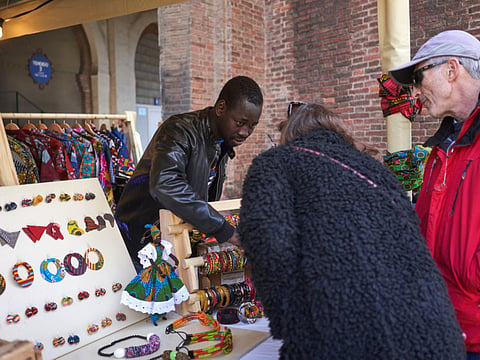Streets paved with dreams
Spain took them in as migrants but they ended up as street vendors who face scorn and political agendas every day

BARCELONA, Spain: On sunny weekends, dozens of sidewalk vendors line up along the seafront promenade in Barcelona, offering wares like purportedly designer-name sunglasses, clothing and other knick-knacks, usually counterfeit.
The vendors, known as manteros, epitomise a quandary facing authorities: It is one thing to debate whether to allow more migrants into the European Union, but quite another to agree on what to do with them once they arrive.
Most manteros are migrants from Africa who have often risked their lives fleeing violence or poverty. But many find when they reach the European Union that landing a regular job without the correct papers is almost impossible — especially in high-unemployment countries like Spain.
To make a living, many join the growing ranks of street sellers. Barcelona has become a hub for manteros, or blanketeers, so called for their practice of spreading their goods on cloth sheets that can easily be folded into a makeshift bag.
New arrivals who turn to street vending in Barcelona normally start out with help from an established mantero. The contact usually lends enough money to buy counterfeit merchandise from one of the warehouses in the nearby city of Badalona.
Hot-button topic
The street vendors, who often approach tourists on the city’s beaches or promenades, have become an increasingly hot-button topic in Spain, and episodes involving manteros have occasionally turned violent.
In recent weeks, a court sentenced a mantero to 4-1/2 months in prison and a fine of 3,500 euros (Dh14,692), for injuring a police officer during a check in Cambrils, a resort south of Barcelona. The mantero repeatedly kicked the officer, who had put his foot on the merchandise cloth to stop the vendor from running away.
Also last month, an American tourist, Jose Bravo, was hospitalised in Barcelona with head injuries after he said he was attacked during a tussle with a street vendor.
The manteros say they are being used as a political football, and point to police excesses. A union formed by vendors recently called on authorities to decriminalise their street selling activities. Vendors have clashed with authorities elsewhere in Spain, including in Madrid in March, when protests turned violent after a Senegalese vendor died of a heart attack after a police check.
The street vendors have found Barcelona to be a relatively good base, largely because the city has plenty of tourists willing to buy counterfeit sunglasses and bags. But many people oppose the sellers’ presence; shopkeepers express particular frustration, saying the manteros are drawing away customers.
“It’s just horrible to have this illegal competition,” said Carlos Servidio, whose market stand offers leather belts and bags manufactured at his workshop in Rubi, a town just outside Barcelona. Born in Argentina, Servidio arrived in Barcelona 30 years ago.
No one knows for sure how big Barcelona’s network of manteros is. Estimates vary from a few hundred to almost 3,000, according to an association of shopkeepers that was formed to protest illegal street vending. City Hall said it had no official data.
Parvati Nair, the Barcelona-based director of the United Nations University Institute on Globalisation, Culture and Mobility, said the absence of figures was a problem. “Street vendors are part of an informal economy that is legally and politically invisible,” she said. “But if we could work at least with exact data, we could come up with better policies for these people.”
In search of stability
Barcelona introduced a cooperative project last year aimed at helping vendors leave the streets and sell items at official handicraft markets instead. The project is intended to let vendors earn money and eventually obtain work permits.
Babacar Diop, from Senegal, was among the 15 vendors selected to begin the cooperative. Having reached Spain a decade ago, he turned to street vending after bouncing for several years between occasional odd jobs, including working as a security guard on a construction site.
“I thought Spain would bring money and stability, but the reality wasn’t like that,” said Diop, 38. The cooperative, he said, was “a chance to stop taking risks on the streets, where you’re always trying to get away from the police.”
‘Would you like to buy a wooden elephant?’
One recent evening, Samba Diallo, 28, ventured out to sell his goods in central Barcelona. Threading his way between tables on a cafe terrace, he held two wooden sculptures of elephants and a large cloth bag over his shoulder filled with bracelets and other trinkets. He headed for a table occupied by three elegantly dressed women; when they saw him approach, two clutched their handbags and waved him off.
At another table, Diallo struck up a conversation with a Dutch family and got the father to hold his elephant sculpture and have his photograph taken alongside him.
The Dutch tourist later explained that he had liked the elephant but worried about buying the bulky object because of luggage restrictions on his low-cost airline ticket.
Diallo failed to find a single buyer that evening. “It’s hard to get people to trust you - and luck also wasn’t on my side today,” he said. “But at least I made somebody happy with a photo souvenir.”
Like many other street vendors, Diallo had not aimed for Barcelona when he decided to migrate to Europe. He crossed from Libya to Italy and spent five years in different Italian cities. He said he had moved to Barcelona after friends advised him that “the Spanish are nicer to African migrants than the people in Italy.” But after a few months, he added, “I’m not so sure that it’s much better here.”
New York Times News Service



